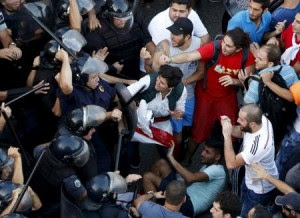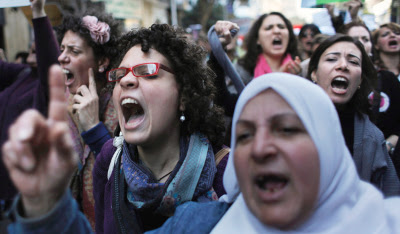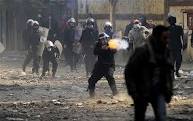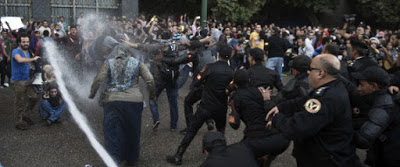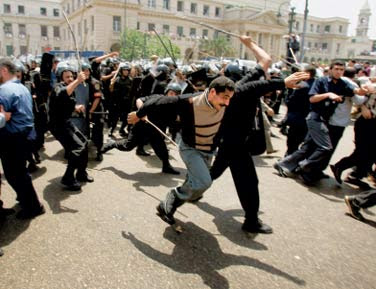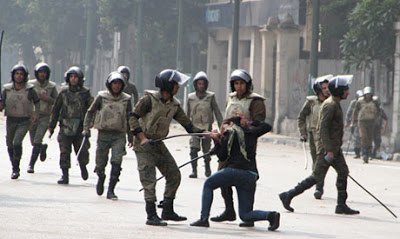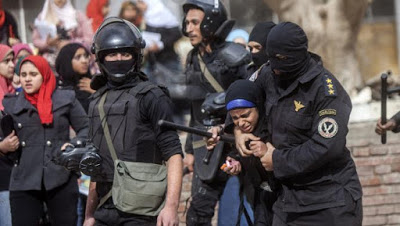It is one of the strange ironies of life that
the leaders of the ‘only democracy in the Middle East’ feel so more comfortable
with a strong dictator than the more anarchic situation in Lebanon. When Hosni Mubarak was in danger of falling
victim to the Spring Revolution in Egypt,
Shimon Peres, Israel’s President and Netanyahu, had kittens.
the leaders of the ‘only democracy in the Middle East’ feel so more comfortable
with a strong dictator than the more anarchic situation in Lebanon. When Hosni Mubarak was in danger of falling
victim to the Spring Revolution in Egypt,
Shimon Peres, Israel’s President and Netanyahu, had kittens.
As Ha’aretz of 24.11.11. reported ‘Netanyahu:Arab Spring Pushing Mideast Backward, Not Forward’ Netanyahu ‘blasted Israeli and world
politicians who support the Arab Spring revolutions and accused the Arab world
of “moving not forward, but backward.’
Even the Americans paid
lip-service to the Egyptian revolution whilst doing their best to subvert
it. Netanyahu wasn’t even prepared to do
that.
politicians who support the Arab Spring revolutions and accused the Arab world
of “moving not forward, but backward.’
Even the Americans paid
lip-service to the Egyptian revolution whilst doing their best to subvert
it. Netanyahu wasn’t even prepared to do
that.
The Ha’aretz report
continued that ‘Netanyahu said. His forecast that the Arab Spring would turn
into an “Islamic, anti-Western, anti-liberal, anti-Israeli and
anti-democratic wave” turned out to be true, he said.’
continued that ‘Netanyahu said. His forecast that the Arab Spring would turn
into an “Islamic, anti-Western, anti-liberal, anti-Israeli and
anti-democratic wave” turned out to be true, he said.’
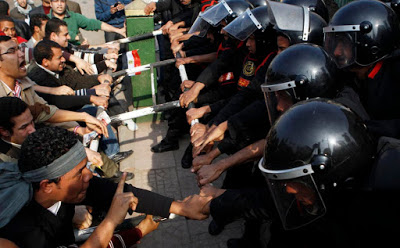 |
| working class faces repression |
Democracy in the Arab world
always means Islam and naturally it is anti-Western and therefore not something
to be encouraged. Unlike Netanyahu and
his Cabinet of enlightened progressives, an Arab revolution would also be ‘anti-liberal’.
always means Islam and naturally it is anti-Western and therefore not something
to be encouraged. Unlike Netanyahu and
his Cabinet of enlightened progressives, an Arab revolution would also be ‘anti-liberal’.
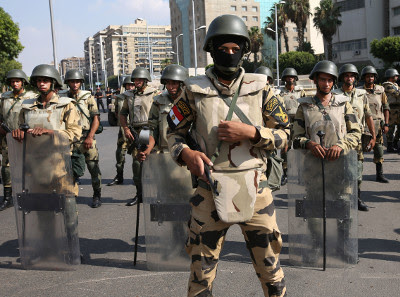 |
| The kind of state the United States loves – Egypt receives the largest US aid after Israel – all military of course |
Who knows they might
organise a beast parade, like that ultra-tolerant Bayit Yehudi MK Bezalel Smotrich whose party is in coalition with Netanyahu. It was meant to be a parody of gays.
organise a beast parade, like that ultra-tolerant Bayit Yehudi MK Bezalel Smotrich whose party is in coalition with Netanyahu. It was meant to be a parody of gays.
Indeed as is his wont, ‘Netanyahu
also slammed Western leaders, and especially U.S. President Barak Obama, who
had pushed Mubarak to resign from power. At the time this was happening
Netanyahu said in closed talks that the American administration and many
European leaders don’t understand reality.’
also slammed Western leaders, and especially U.S. President Barak Obama, who
had pushed Mubarak to resign from power. At the time this was happening
Netanyahu said in closed talks that the American administration and many
European leaders don’t understand reality.’
Israel and Netanyahu will of
course be pleased with the General Sisi, the Egyptian President, who runs an
even more repressive regime than did Hosni Mubarak.
course be pleased with the General Sisi, the Egyptian President, who runs an
even more repressive regime than did Hosni Mubarak.
Repression in the Middle
East will never attract Israeli criticism unless the regime concerned is
hostile to Zionism or Israeli policy in any way.
East will never attract Israeli criticism unless the regime concerned is
hostile to Zionism or Israeli policy in any way.
Below is an article from the
Egyptian Institute for Human Rights calling for the repeal of a law that
effectively bans all demonstrations.
Egyptian Institute for Human Rights calling for the repeal of a law that
effectively bans all demonstrations.
President Must Repeal Unfair Protest Law and Immediately Release Thousands of Innocents
The undersigned organizations the prosecution
and detention of tens of thousands of people for exercising their right to
peaceful protest and assembly or for simply being in the area of such protests,
in the wake of the adoption on November 24, 2013 of the law regulating public
assemblies, processions, and peaceful demonstrations in public places, known as
the protest law. The law was issued by Presidential Decree 107/2013 despite the
widespread objections of
rights groups, numerous political and public-interest forces, and six
ministers, as well as a warning
from the previous UN High Commissioner for Human Rights Navi Pillay that
the law could lead to serious violations of the right to freedom of peaceful
assembly.
and detention of tens of thousands of people for exercising their right to
peaceful protest and assembly or for simply being in the area of such protests,
in the wake of the adoption on November 24, 2013 of the law regulating public
assemblies, processions, and peaceful demonstrations in public places, known as
the protest law. The law was issued by Presidential Decree 107/2013 despite the
widespread objections of
rights groups, numerous political and public-interest forces, and six
ministers, as well as a warning
from the previous UN High Commissioner for Human Rights Navi Pillay that
the law could lead to serious violations of the right to freedom of peaceful
assembly.
The undersigned organizations reiterate their
demand for the repeal of the law and the immediate release of all persons
detained or convicted under it. If the law remains in force when the incoming
parliament is convened, we urge parliamentarians not to approve it, to annul
all consequent prosecutions and sentences, and suspend enforcement of the law
until a new law can be issued that complies with the provisions of the
constitution, adheres to international standards, and responds to the
recommendations of the National Council on Human Rights and rights groups,
while putting the law up for social debate.
demand for the repeal of the law and the immediate release of all persons
detained or convicted under it. If the law remains in force when the incoming
parliament is convened, we urge parliamentarians not to approve it, to annul
all consequent prosecutions and sentences, and suspend enforcement of the law
until a new law can be issued that complies with the provisions of the
constitution, adheres to international standards, and responds to the
recommendations of the National Council on Human Rights and rights groups,
while putting the law up for social debate.
Interim President Adli Mansour issued the law in
November 2013 over the objections of six ministers, among them the deputy prime
minister for economic affairs and the foreign minister, who detailed the
grounds of their objection on October 9. Confirming the fears of civil forces,
the law has been used to criminalize all forms of peaceful assembly, including
public demonstrations and meetings, and has legitimized the use of excessive
force to disperse peaceful assemblies.
November 2013 over the objections of six ministers, among them the deputy prime
minister for economic affairs and the foreign minister, who detailed the
grounds of their objection on October 9. Confirming the fears of civil forces,
the law has been used to criminalize all forms of peaceful assembly, including
public demonstrations and meetings, and has legitimized the use of excessive
force to disperse peaceful assemblies.
This law was the first of a raft of legislation
that contravened the spirit and letter of the 2014 constitution. Current
President Abd al-Fattah al-Sisi has issued numerous such laws, including the
law on terrorist entities, the counterterrorism law, and amendments to Article
78 of the Penal Code on foreign funding,. The Cairo Administrative Court agreed
in June 2014 to refer a case challenging the constitutionality of the protest
law to the Supreme Constitutional Court.
that contravened the spirit and letter of the 2014 constitution. Current
President Abd al-Fattah al-Sisi has issued numerous such laws, including the
law on terrorist entities, the counterterrorism law, and amendments to Article
78 of the Penal Code on foreign funding,. The Cairo Administrative Court agreed
in June 2014 to refer a case challenging the constitutionality of the protest
law to the Supreme Constitutional Court.
While the government justified the adoption of
the protest law by pointing to the need to confront demonstrations by a
particular political faction and restore stability to the Egyptian street, the
situation in Egypt is now less stable than ever. Violent extremism is finding
new supporters by the day, and prisons have become recruiting grounds for
violent groups.
the protest law by pointing to the need to confront demonstrations by a
particular political faction and restore stability to the Egyptian street, the
situation in Egypt is now less stable than ever. Violent extremism is finding
new supporters by the day, and prisons have become recruiting grounds for
violent groups.
Joining a peaceful demonstration carries numerous risks,
from the arbitrary killing to arrest and sentencing of up to five years in
prison in some cases, or prolonged pretrial detention.
from the arbitrary killing to arrest and sentencing of up to five years in
prison in some cases, or prolonged pretrial detention.
In contrast, with the exception of the killing
of Shaimaa al-Sabbagh, security forces are not held accountable or prosecuted
for the use of lethal force to disperse demonstrations; the few cases that were
subject to investigation or trial ended with their acquittal. At the same time,
the Supreme Constitutional Court has failed to take up constitutional appeals
to decrees issued by the minister of interior that justify the murder of
peaceful demonstrators.
of Shaimaa al-Sabbagh, security forces are not held accountable or prosecuted
for the use of lethal force to disperse demonstrations; the few cases that were
subject to investigation or trial ended with their acquittal. At the same time,
the Supreme Constitutional Court has failed to take up constitutional appeals
to decrees issued by the minister of interior that justify the murder of
peaceful demonstrators.
The performance and practices of security forces
in Egypt has not changed. The same violations and crimes are
committed with every peaceful assembly and demonstration. On January 24,
2015, human rights defender Shaimaa al-Sabbagh was shot and killed by security
forces as they dispersed a peaceful protest march calling for bread, freedom,
and social justice and carrying flowers to commemorate the martyrs of the
January revolution. The next day, security forces used lethal force against
demonstrators in various locations in Cairo and Alexandria, leaving dozens of
protestors and ordinary citizens dead or injured.
in Egypt has not changed. The same violations and crimes are
committed with every peaceful assembly and demonstration. On January 24,
2015, human rights defender Shaimaa al-Sabbagh was shot and killed by security
forces as they dispersed a peaceful protest march calling for bread, freedom,
and social justice and carrying flowers to commemorate the martyrs of the
January revolution. The next day, security forces used lethal force against
demonstrators in various locations in Cairo and Alexandria, leaving dozens of
protestors and ordinary citizens dead or injured.
Under the law hundreds of demonstrators have
been arrested for failing to obtain demonstration permits from the competent
security bodies. The law requires organizers of assemblies to meet several
unreasonable, impractical conditions while giving the Ministry of Interior the
right to object to any “notice” of an impending demonstration on vague grounds,
such as information that it may threaten security or peace. In practice, this
means that individuals’ exercise of the right of peaceful assembly is subject
to a system of prior permit, which contravenes Articles 73 of the
constitution and Article
10 of the constitutional declaration of July 8, 2013, in force when the
protest law was issued.
been arrested for failing to obtain demonstration permits from the competent
security bodies. The law requires organizers of assemblies to meet several
unreasonable, impractical conditions while giving the Ministry of Interior the
right to object to any “notice” of an impending demonstration on vague grounds,
such as information that it may threaten security or peace. In practice, this
means that individuals’ exercise of the right of peaceful assembly is subject
to a system of prior permit, which contravenes Articles 73 of the
constitution and Article
10 of the constitutional declaration of July 8, 2013, in force when the
protest law was issued.
Despite sentencing hundreds to prison for
demonstrating, the Egyptian judiciary has not seriously examined the repeated
police allegations that typically accompany arrests for demonstrating without a
permit, including assembly, blocking public roads, and assaulting security
personnel, accepting such allegations as fact even in the absence of credible
evidence. In contrast, it has taken no action on complaints by defendants in
demonstration cases alleging that they and their families have faced grave
physical assaults by security personnel, despite legal documentation of these
assaults, even voluntary witnesses are sometimes treated as suspects and
referred to investigation and trial.
demonstrating, the Egyptian judiciary has not seriously examined the repeated
police allegations that typically accompany arrests for demonstrating without a
permit, including assembly, blocking public roads, and assaulting security
personnel, accepting such allegations as fact even in the absence of credible
evidence. In contrast, it has taken no action on complaints by defendants in
demonstration cases alleging that they and their families have faced grave
physical assaults by security personnel, despite legal documentation of these
assaults, even voluntary witnesses are sometimes treated as suspects and
referred to investigation and trial.
Most recently, security forces arrested 13
demonstrators on November 19 for participating in demonstrations to commemorate
the fourth anniversary of the Mohammed Mahmoud events. The prosecution charged
the demonstrators with demonstrating without giving notice, assembly, and
blocking roads. Although a judge with the Qasr al-Nil court ordered the
defendants released on bail, the Public Prosecution contested the order. The
Qasr al-Nil Appellate Misdemeanor Court, convened in chambers on November 23,
subsequently ruled for the prosecution, after which the defendants were
remanded for 15 days.
demonstrators on November 19 for participating in demonstrations to commemorate
the fourth anniversary of the Mohammed Mahmoud events. The prosecution charged
the demonstrators with demonstrating without giving notice, assembly, and
blocking roads. Although a judge with the Qasr al-Nil court ordered the
defendants released on bail, the Public Prosecution contested the order. The
Qasr al-Nil Appellate Misdemeanor Court, convened in chambers on November 23,
subsequently ruled for the prosecution, after which the defendants were
remanded for 15 days.
The confiscation of the right of expression and
peaceful assembly through liberty-depriving penalties was and remains part of a
systematic plan to shut down the public sphere. The incoming parliament must be
aware of the consequences of enforcing unconstitutional laws and violating
fundamental rights and liberties and how these laws have a negative effect on
Egypt’s stability.
peaceful assembly through liberty-depriving penalties was and remains part of a
systematic plan to shut down the public sphere. The incoming parliament must be
aware of the consequences of enforcing unconstitutional laws and violating
fundamental rights and liberties and how these laws have a negative effect on
Egypt’s stability.
The undersigned organizations therefore call on
the following:
the following:
- The president must repeal the protest law or use
his constitutional powers of pardon to immediately pardon persons
convicted for exercising their right to peaceful assemble and
demonstration. - The parliament must not approve the protest law.
It should hold debates on the rules necessary to guarantee the right of
peaceful assembly as is consistent with the constitution and international
standards while involving human rights organizations in these debates.
Signatory organizations
- Cairo Institute for Human Rights Studies
- Alhaqanya Center for Law and Legal profession
- Andalus Institute for Tolerance and Anti-Violence
Studies - Appropriate Communications Techniques for
Development - Arab Network for Human Rights Information
- Arab Penal Reform Organization
- Association for Freedom of Thought and Expression
- Center for Egyptian Women’s Legal Assistance
- Egyptian Commission for rights and freedoms
- El-Nadeem Centre for the rehabilitation of
victims of violence and torture - Masryoon Against Religious Discrimination
- National group for human rights and law
- The Egyptian Center for Economic and Social
Rights - The Egyptian Center for Public Policy Studies
- The Egyptian Initiative for Personal Rights
- The New Woman Foundation
Posted in Blog
